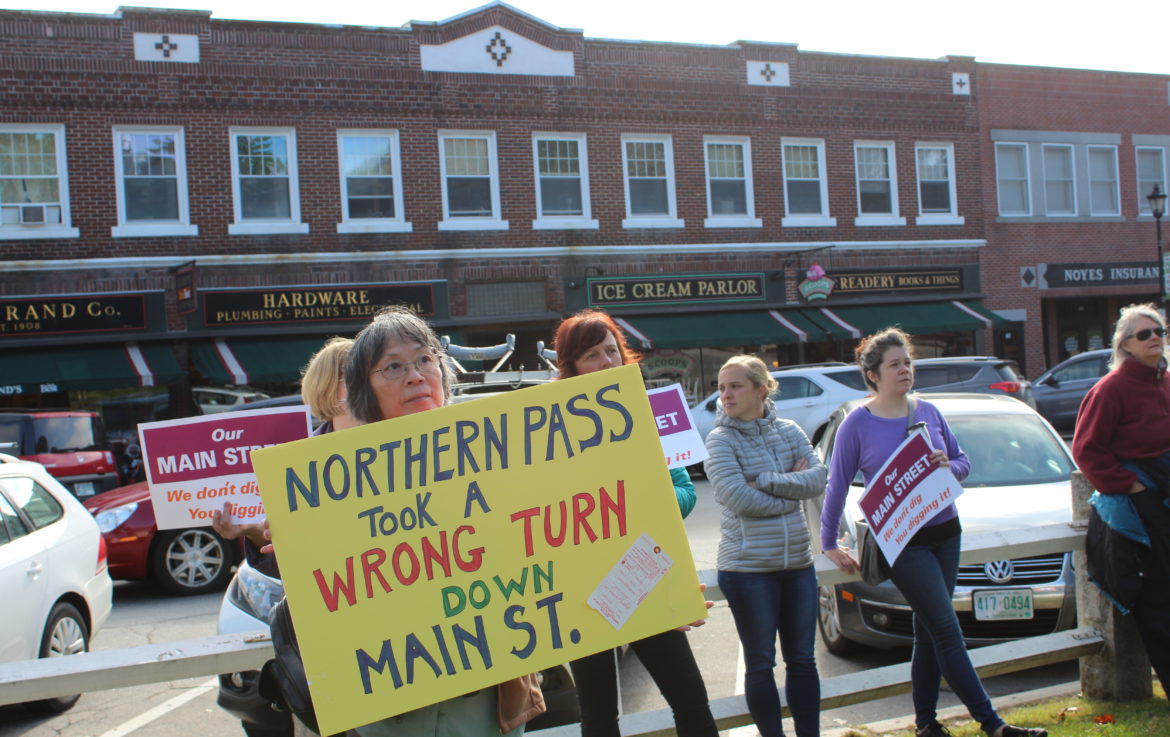Subscribe to our free newsletter here.
By GARRY RAYNO, InDepthNH.org
CONCORD — Several intervenor groups claim Eversource raised issues in its appeal of the regulators’ decision to deny the Northern Pass project that the state Supreme Court should not consider.
In a filing Feb. 14, intervenors claim the sections in question were either not part of the proceeding’s record or were not preserved by Eversource when it requested the Site Evaluation Committee reconsider its decision.
A year ago, the SEC determined Eversource failed to meet it burden of proof the project would not unduly impact the orderly development of the region, saying company experts on tourism, property values and land use were not credible.
The impact on orderly development is one of four criteria regulators must use to determine if a project certificate may be issued.
The intervenors, including several municipal groups, Concord, Conservation Law Foundation, Society for the Protection of New Hampshire Forests and several individuals say sections on the Seacoast Reliability Project proceedings should be stricken from the Eversource brief and appendix because they are not part of the record for the Northern Pass decision.
The intervenors say the 23-page section on the Seacoast Reliability Project is unreliable and fails to provide the context of the discussion.
“The arguments and evidence relating to the deliberations in the Seacoast Reliability Project should be stricken because they are not part of the record,” writes attorney Christine Fillmore, representing the towns of Bethlehem, Bristol, Easton, Franconia, Northumberland, Plymouth and Sugar Hill. “The record in this case was transferred by the SEC on December 11, 2018. It is inappropriate for the appellants to now attempt to expand the record by submitting 23 selected pages of deliberations from an unrelated proceeding before the SEC.”
She said the reliability project is significantly different from the Northern Pass Transmission project and was heard before a different subcommittee of the SEC.
Sections raised by Eversource in its brief claiming the SEC failed to decide the extent of the forward capacity market benefits should also be stricken because the developer did not preserve the issue in its motion for rehearing filed April 27, 2018.
“The appellants never raised the argument that the SEC failed to make sufficient findings regarding the extent of forward capacity market benefits and how they would affect the region’s economy,” writes attorney Fillmore. “The arguments now raised in the brief are significantly different and unrelated to any arguments raised before the SEC.”
The intervenors say they understand the Supreme Court may not rule on their motion until its opinion on the case is issued, but raise the issues to ensure they are preserved.
Eversource appeal
Earlier this month, Eversource filed its brief in the appeal, claiming the SEC failed to do the work required under statutes and its rules, strayed from normal regulatory procedures, made an arbitrary and unreasonable decision, and failed to weigh the project’s benefits against its undue impacts.
“Instead, in its haste to be done, it elected to cut short deliberations, seize on the applicants’ purported failures to satisfy hitherto nonexistent burdens of proof, and concluded that it had no obligation to go further,” writes attorney Wilbur Glahn, who will argue the case for Eversource before the court later this year. “This resulted in an unlawful, arbitrary and unreasonable decision.”
Glahn called the proceeding a textbook case of arbitrary administrative decision making that violates the law and the company’s due process rights.
Eversource asks the court to vacate the SEC’s order and remand the case back with instructions to make all the statutory findings, apply clear standards, consider all evidence and mitigations, and weigh the benefits and impacts of the project.
Intervenors and others opposing the appeal have until March 21 to file their briefs with the Supreme Court.
The high-voltage transmission project through the North Country, White Mountains, Lakes Region and Capital area has been controversial since it was first proposed in 2010.
Developers agreed to bury about 60 miles of the line, mostly through the White Mountain National Forest, while much of the rest of the line would be in existing utility rights-of-way, although with larger towers.
The 192-mile, $1.6 billion project did include a new 32-mile transmission corridor through the state’s most northern communities.
The project was opposed by environmentalists and conservationists, small business owners, residents along the route, local municipal and planning officials and all but two of the host communities.
The project had the support of large businesses and business organizations, unions and economic development officials.
Northern Pass was initially chosen for the Massachusetts clean energy project to transport Hydro-Quebec power to the Bay State but was abandoned in favor of a similar project through Maine after New Hampshire regulators turned down Eversource’s application.
Garry Rayno may be reached at garry.rayno@yahoo.com.





